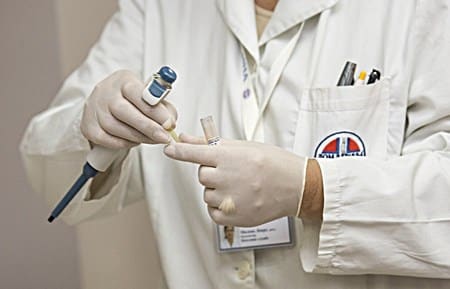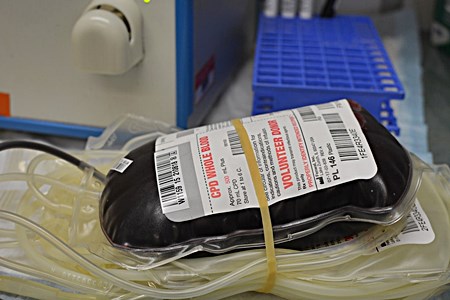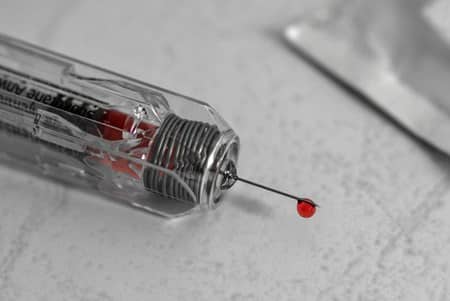Blood work is a steadily growing part of the healthcare system. From rewarding entry-level careers with minimal training to lucrative jobs that can help to discover diseases and find new treatment, it’s an exciting field that can make a big difference in the world of medicine.
Medical professionals who work with blood go far beyond doctors and surgeons. It’s important to understand what an influential role blood work plays in health care. The jobs that work with blood and testing each day are imperative when it comes to discovering illnesses, and so much more.
If you’ve ever been interested in working with blood, there are multiple career options. Some of these careers are more patient-focused. Others deal with behind the scenes work, where blood is examined. Here’s some information on the best-paid jobs in the medical profession.
In this article, we’ll cover several different jobs in blood work. We’ll also go over what blood tests can show, so you can increase your understanding of just how important these careers are to advancements in medicine.
[su_list icon=”icon: check-circle”]
Phlebotomist
Aside from doctors and surgeons, phlebotomists are often the first position to come to mind when people consider working with blood. Simply put, a phlebotomy technician is someone who draws blood from patients, organizes and labels it appropriately, and works with a medical lab.
Blood draws by a phlebotomist can be used for a variety of different things, including any of the tests listed above.
Is a Degree Necessary to Become a Phlebotomist?
Phlebotomy is becoming one of the fastest-growing jobs in medicine. It’s considered an entry-level job. Many people use it as a stepping stone toward a more advanced medical career. But, being a phlebotomist can be a lifelong career on its own, with plenty of room for growth.
One of the reasons it continues to grow in popularity is due to the training/schooling involved. It’s one of the quickest ways to get into the medical field. Most training programs to become a phlebotomist last just several months. Even with additional certification (which is required in most states), you can become a certified phlebotomist in less than a year.
Another reason training is so popular is because it’s convenient. There is a growing need for qualified phlebotomists all over the country. Because of this need, training opportunities have continued to pop up. You can train to become a phlebotomy technician at the best school. Or, seek out specialized training programs. Some schooling is even available online, though it is required that you have hands on experience with venipuncture.
Because hospitals are looking for more phlebotomists, some even offer training programs. One of the great things about these particular programs is they almost ensure you a job with that hospital when you’re finished.
Phlebotomy training is fast, relatively inexpensive, and can often be done on your own time if you’re currently involved in another career. It’s a great opportunity for entering the medical field, and there are also some excellent opportunities for career advancement.

What to Expect on the Job
Phlebotomists can work in hospitals, clinics, private practices, and more. You can even decide to do more individual work, and hire yourself out for places like the American Red Cross, nursing homes, or prisons. These places may not always need a phlebotomist on staff every day, but by being available for specific jobs, you’re more in control of your schedule.
Phlebotomists should be highly organized, professional, and able to multi-task. You’ll be on your feet for the majority of the day, working with patients and transporting blood vials to a medical lab for testing.
It’s also important that phlebotomists are friendly and gentle. They can often be the first person a patient sees since blood often needs to get drawn before any medical diagnosis can be provided by a physician. Some people are uncomfortable when it comes to giving blood, so it’s up to the technician to make sure they are at ease.
The average yearly pay rate for a phlebotomist is $20,080. Because it is considered an entry-level career, you can advance to a supervisory position (or another job in medicine) with additional training/schooling.
Phlebotomy is one of the most important jobs in blood work because it deals directly with patients and a team of healthcare individuals. If drawing blood and working with a variety of different people on a daily basis sounds like something you would enjoy, you might consider a career in phlebotomy.
Medical Laboratory Technician
Medical laboratory technicians (also known as medical laboratory scientists) perform tests to analyze different bodily fluids, including blood. They provide direct assistance to physicians with these various tests. Not only can they assist in the prevention of illness, but the diagnosis and treatment. Some of these illnesses include cancer, AIDS, and diabetes.
It is the job of a medical lab tech to determine the cause of a particular condition, by performing various tests. While most lab techs work in hospitals under a general practice, there are also specializations to this job, including:
- Hematology
- Blood banking
- Clinical chemistry
- Microbiology
What Type of Training is Involved?
Training to become a medical lab technician is a hands-on program. It requires you to complete some certification, or receive an associate’s degree from a credited institution or college. These degrees typically take about two years to complete. However, you may be able to speed up the processes, depending on your course load.
Most medical lab technician training will cover subjects like human anatomy, blood coagulation, microbiology, and biochemistry. The idea is to learn the skills that will allow you to perform life-saving tests on patients.
To be comfortable working with physicians to help diagnose illnesses, most medical lab technician training courses also require a clinical practicum. This allows you even more hands-on experience. It also prepares you for the fast-paced environment that comes from working in a hospital.
When you complete your training, many schools offer free application to take the MLT certification exam. Even if the state you plan on working in doesn’t require certification, it’s always a good idea to take this extra step. Not only could your state eventually require it, but it will help you to stand out in the job market.
What Does a Medical Lab Tech Do?
Medical laboratory technicians do everything from sanitizing laboratories, to matching blood compatibility for transfusions. They collect and analyze blood samples, along with other bodily fluids, to determine any underlying health conditions or diseases.
One of the most important things expected of a quality lab tech is the ability to handle and operate sophisticated equipment. It’s this equipment that is designed to help search for microorganisms within fluid samples. Because of these responsibilities, it’s imperative that a technician is detail-oriented and knows how to follow instructions and procedures properly.
Typically, a medical lab technician is a starting point for those who want to grow to more advanced areas in medicine. A medical laboratory technologist, for example, is often the next step up from a technician. Medical lab technologists require a Bachelor’s Degree and additional certification. Technologists often perform more complicated tests. If you do wish to advance your education and become a medical technologist, you may be a supervisor to a medical lab technician.
A medical lab tech makes an average of $38,950 as of May 2016. With additional schooling to become a lab technologist, you can make an average of $61,070 per year.

Nurses
When it comes to blood work, nurses sometimes have similar responsibilities to phlebotomists. They can draw blood directly from patients, and label it appropriately before sending it to the lab for testing.
However, that is mostly where the similarities between the two positions end. The big difference between nurses and phlebotomists is the number of responsibilities. Nurses can do a much wider range of tasks than a phlebotomist – drawing blood is just one of them.
How Many Years of Schooling is Necessary?
There are different ways to become a registered nurse. To become an entry-level nurse or an LPN, it can take as little as one year of training. These nurses have to remain under the supervision of RNs (registered nurses).
Becoming an RN requires quite a bit of study. This is due to the advanced responsibilities and expectations involved. At the very minimum, most nurses are required to take two years of schooling. If you wish to obtain a Bachelor’s Degree of Science in nursing, you’ll need to attend a four-year college and complete the required coursework.
What Are the Job Expectations?
Nurses can do everything from draw blood from patients, to administer medicine, and directly assist physicians. Blood work isn’t the primary focus of their responsibilities, but it is sometimes required.
More typical nursing job duties include:
- Managing IV lines
- Educating patients on general healthcare
- Working directly with doctors
- Advising patients on how to use medication
According to the Bureau of Labor Statistics, registered nurses make an average of $69,110 each year. This number varies based on the location and facilities. Nurses who work in a larger environment are likely to make more than those who work in a private practice or small clinic.
While nurses do have to work with blood regularly, the main focus is on a variety of different responsibilities. While schooling to become a nurse typically takes longer than that of a phlebotomist, the salary is increased as well. If you want to work with blood and put more responsibilities on your plate, nursing could be a great way to go.
Blood Bank Technician
Another job that is often compared to phlebotomy is that of a blood bank technician. Duties tend to vary on a state by state basis. But, the biggest job of a blood bank technician is to store blood draws in an organized manner. They are also required to maintain records and any documentation that goes along with each draw.
Training Programs for Blood Bank Technicians
Blood bank technicians must either earn medical certification or complete an associate’s degree. Most certification can be completed at a technical school, specialized course, or even through courses offered by hospitals. Training will typically cover many of the subjects discussed in phlebotomy courses, including:
- Anatomy
- Medical terminology
- Lab procedures
- Blood drawing techniques
Usually, blood bank technicians will also hold a phlebotomy certificate. This gives them the ability to draw blood properly and be in charge of storing the draws until they are needed by the lab. Certification varies from state to state, but with more states starting to require certification, it’s a good idea to take the extra steps to obtain it.

What is the Work Environment?
A blood bank technician will work directly under the supervision of a medical laboratory technologist. They prepare blood and plasma for transfusions and keep accurate records of all the blood stored, and its purpose.
The average salary for a blood bank technician is about $59,500 per year. If you choose to further your education and seek a supervisory role, that salary may become closer to $80,000.
Blood bank technicians may work directly with the public more than a phlebotomist. They conduct interviews with blood donors and learn more about them before actually performing venipuncture. Once blood or plasma has been donated, it’s the job of the technician to keep track of what type of blood it is, and its purpose. If you’ve ever given blood before, you’ve likely worked with a blood bank technician.
Haematologist
A haematologist’s entire career is based on blood research. Unlike regular lab technicians, haematologists typically work in specialized hospital departments. They help to analyze blood results, seek out irregularities, and carry out important medical research.
While being crucial to future research and diagnosis, they also help to care for patients who have conditions of the blood and organs. While most of their time is spent in a lab, they do work with patients face-to-face.
Do I Need an Advanced Degree?
To become a haematologist, you either need to be a clinical scientist or biomedical scientist. An accredited degree is necessary, as there is no outside training program for this career.
In addition to initial schooling, which may take several years, training to become a haematologist is ongoing throughout the career. With new technologies and research advancements happening all the time, it’s imperative for a haematologist to stay up to date with the latest findings and research methods.
What Will the Job Look Like?
Most of what a haematologist can expect throughout their career is consistent research. Many of these professionals write peer-reviewed journals or submit research for universities, etc. Some choose to find a specialty within the field, focusing on one area of blood research.
On average, haematologists make between $200,000-$300,000 each year. The salary is due to experience and the type of advanced degree you have. So, while it does take quite a bit of schooling to get into this lucrative career, the pay compensates for it.
Becoming a haematologist is a great way to work directly with blood, have a chance to work with patients, and know that your research could change the medical world. It takes a strong interest in biology and life sciences, as well as patience and the ability to pay attention to detail as you’re researching.
Physician – Blood Transfusions
As stated above, doctors and surgeons may deal with blood in different settings on a regular basis. One of the most routine blood work procedures, however, is a transfusion. Blood transfusions are procedures in which blood that has been donated is added to your existing blood. It may also be used with your own donated blood if you donated before having some elective surgery.
There are many possible reasons people undergo blood transfusions, which is why they have become so routine for doctors. Some of the most common reasons people receive blood transfusions include:
- Surgery
- Severe injury
- Gastrointestinal bleeding
- Cancer
- Blood disorders
Blood transfusions can be done at hospitals, doctor’s offices, or even an outpatient clinic. As a doctor or nurse, you may be required to perform or assist on blood transfusions. When you do, you’ll be working directly with donated blood from a bank, or the patient’s donation. It’s a blood work job that requires a phlebotomist and blood bank technician to perform their responsibilities in drawing and storing before the procedure can be performed.

What Are the Benefits of a Job in Blood Work?
To learn about the benefits of a career in blood work, you have to first look at the benefits of working in the healthcare system. Year after year, the healthcare industry continues to rise in popularity on the job market. Where other industries seem to be slowing down, there is a constant need for qualified individuals to take jobs in the medical field, and there are some hospital jobs that don’t require a medical degree.
These jobs range from positions that require little training, to those that take years of schooling. The healthcare industry not only continues to grow and thrive, but it offers plenty of lucrative jobs with above average salaries.
Because of that popularity, one of the benefits of a career in medicine is how easy it can be to find a good job. There are many entry level positions (including phlebotomy) that take very little training. These jobs can either turn into lifelong careers or can work as springboards to more advanced jobs in medicine.
Most of the careers in blood work are also versatile when it comes to location. As a phlebotomist, medical lab technician, blood bank technician, or even a physician, your opportunities for working in different spaces are endless. While many of these jobs are based in hospitals, there are also growing needs in private practices, clinics, and even nonprofit organizations. Because blood testing is so important in a variety of different ways, the job market for those who can work with blood continues to grow.
Ultimately, the biggest benefit of a career in blood work is the difference you’ll be making. As stated above, there are many different reasons people get blood tests. Sometimes they are routine. But, they can also save lives and catch illnesses early on. Many of these careers offer opportunities to work directly with patients and help to discover any conditions they might be facing before any other type of testing could.
Should I Consider a Career in Blood Work?
As you can see, there are many careers that are like phlebotomy. Many healthcare positions will require you to see blood once in awhile, even if you don’t come in contact with it. Blood work positions aren’t necessarily for those who are squeamish or have a hard time working with human organs.
However, there are many facets of these particular jobs. Some offer a more hands-on approach to dealing with blood. Others are more scientific and research-based. Training levels also vary greatly, depending on the type of work you do. If working with blood interests you, finding a steady job within the medical field may be easier than you think. Consider what type of training/schooling you’re willing to do, and what type of work interests you the most. From there, a helpful career in dealing with blood could be just around the corner.
Since blood can provide doctors and scientists with different interesting facts, it’s no wonder the healthcare industry continues to grow. Jobs dealing with blood work are no exception. In fact, some jobs listed in this article are quickly becoming some of the most popular in the medical field.
[/su_list]





